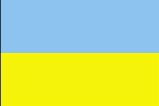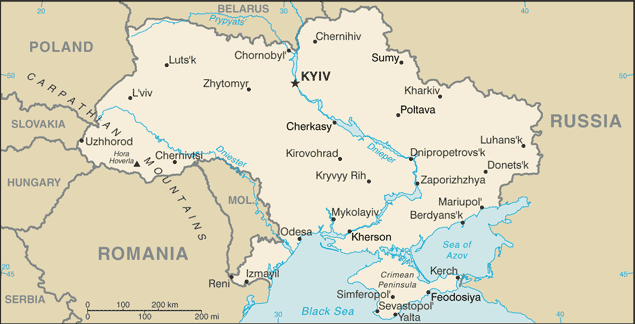|
Ukraine
|

|
Capital: Kyiv
Population: 43,993,638
Brief History of Ukraine:
Ukraine was first populated by nomadic tribes such as the Cimmerians, Scythians, and the Goths. Both Greece and Rome established cities in the Ukraine when at the peak of their empires.
In the 10th century, the Kievan Rus emerged as a growing city-state based out of the city of Kiev. By the 11th century the Kieven Rus was the largest empire in Europe. With the rule of Vladimir the Great in 980, the Kievan Rus became a Christian empire and reached its peak under the rule of his son, Yaroslav the Wise. In the 12th century the empire began to decline and in the 13th century Mongol raiders destroyed the city of Kiev.
In later years, the Ukraine would become part of other countries, first Poland and later Russia. The Ukrainians made efforts to keep their culture alive despite limits imposed on them by Russia. Russia even banned the use and study of the Ukrainian language. When the Soviet Union took over, things became even worse. Joseph Stalin created an artificial famine to maintain control of the area which killed millions of people. World War II did not make things better for the Ukraine. It is estimated that the German Nazi's killed 1 million Ukrainian Jewish people.
Yet another disaster struck the Ukraine in 1986 when the Chernobyl nuclear power plant exploded. The Soviet Union tried to hide the disaster and refused international help. Finally, the Soviet Union collapsed and Ukraine became an independent country in 1991.
The Geography of Ukraine
Total Size: 603,700 square km
Size Comparison: slightly smaller than Texas
Geographical Coordinates: 49 00 N, 32 00 E
World Region or Continent: Europe
General Terrain: most of Ukraine consists of fertile plains (steppes) and plateaus, mountains being found only in the west (the Carpathians), and in the Crimean Peninsula in the extreme south
Geographical Low Point: Black Sea 0 m
Geographical High Point: Hora Hoverla 2,061 m
Climate: temperate continental; Mediterranean only on the southern Crimean coast; precipitation disproportionately distributed, highest in west and north, lesser in east and southeast; winters vary from cool along the Black Sea to cold farther inland; summers are warm across the greater part of the country, hot in the south
Major cities: KYIV (capital) 2.779 million; Kharkiv 1.455 million; Dnipro 1.013 million; Odesa 1.009 million; Donetsk 971,000 (2009)
The People of Ukraine
Type of Government: republic
Languages Spoken: Ukrainian (official) 67%, Russian 24%, small Romanian-, Polish-, and Hungarian-speaking minorities
Independence: 24 August 1991 (from the Soviet Union)
National Holiday: Independence Day, 24 August (1991); 22 January (1918), the day Ukraine first declared its independence (from Soviet Russia) and the day the short-lived Western and Central Ukrainian republics united (1919), is now celebrated as Unity Day
Nationality: Ukrainian(s)
Religions: Ukrainian Orthodox - Kyiv Patriarchate 19%, Orthodox (no particular jurisdiction) 16%, Ukrainian Orthodox - Moscow Patriarchate 9%, Ukrainian Greek Catholic 6%, Ukrainian Autocephalous Orthodox 1.7%, Protestant, Jewish, none 38% (2004 est.)
National Symbol: trident (tryzub)
National Anthem or Song: Sche ne vmerla Ukraina (Ukraine Has Not Yet Perished)
Economy of Ukraine
Major Industries: coal, electric power, ferrous and nonferrous metals, machinery and transport equipment, chemicals, food processing (especially sugar)
Agricultural Products: grain, sugar beets, sunflower seeds, vegetables; beef, milk
Natural Resources: iron ore, coal, manganese, natural gas, oil, salt, sulfur, graphite, titanium, magnesium, kaolin, nickel, mercury, timber, arable land
Major Exports: ferrous and nonferrous metals, fuel and petroleum products, chemicals, machinery and transport equipment, food products
Major Imports: energy, machinery and equipment, chemicals
Currency: hryvnia (UAH)
National GDP: $329,300,000,000
** Source for population (2012 est.) and GDP (2011 est.) is CIA World Factbook.
Back to Geography Home Page
